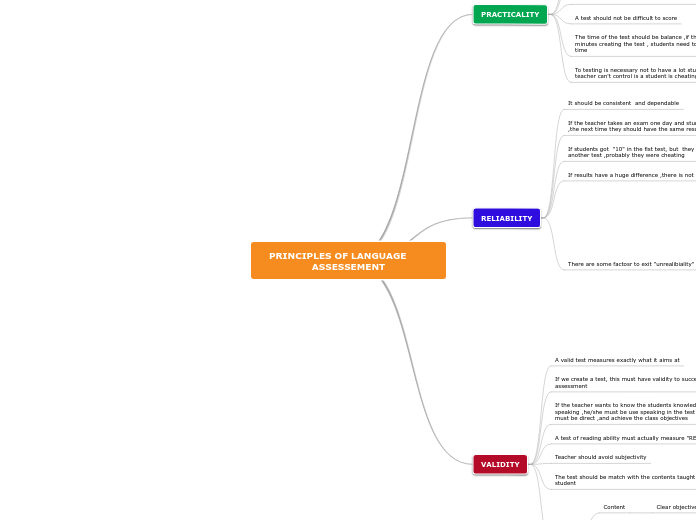PRINCIPLES OF LANGUAGE ASSESSEMENT
PRACTICALITY
To create and effective test we need to be practical
Test doen't need to be expensive
A test is practical when it is not to long for students or teachers
A test should not be difficult to score
The time of the test should be balance ,if the teacher took 10 minutes creating the test , students need to take the similar time
To testing is necessary not to have a lot students , because teacher can't control is a student is cheating or not.
RELIABILITY
It should be consistent and dependable
If the teacher takes an exam one day and students got "10" ,the next time they should have the same results
If students got "10" in the fist test, but they got a "5" in the another test ,probably they were cheating
If results have a huge difference ,there is not realibility
There are some factosr to exit "unrealibiality"
STUDENTS-RELATED ISSUES
Temporary Illness
Fatigue
"Bad day"
Rater
If the teacher is tired he/she may score wrong
TEST ADMINISTRATION
Avoid noise when students are having a test , for example in a listening text
Do the test objective with clear instructions
VALIDITY
A valid test measures exactly what it aims at
If we create a test, this must have validity to succed in the assessment
If the teacher wants to know the students knowledge about speaking ,he/she must be use speaking in the test ,he/she must be direct ,and achieve the class objectives
A test of reading ability must actually measure "READING"
Teacher should avoid subjectivity
The test should be match with the contents taught to the student
TYPES
Content
Clear objectives are presented in the test
Criterion
Specified classroom objectives are measured
Face
The degree to which a test looks righ
Construct
